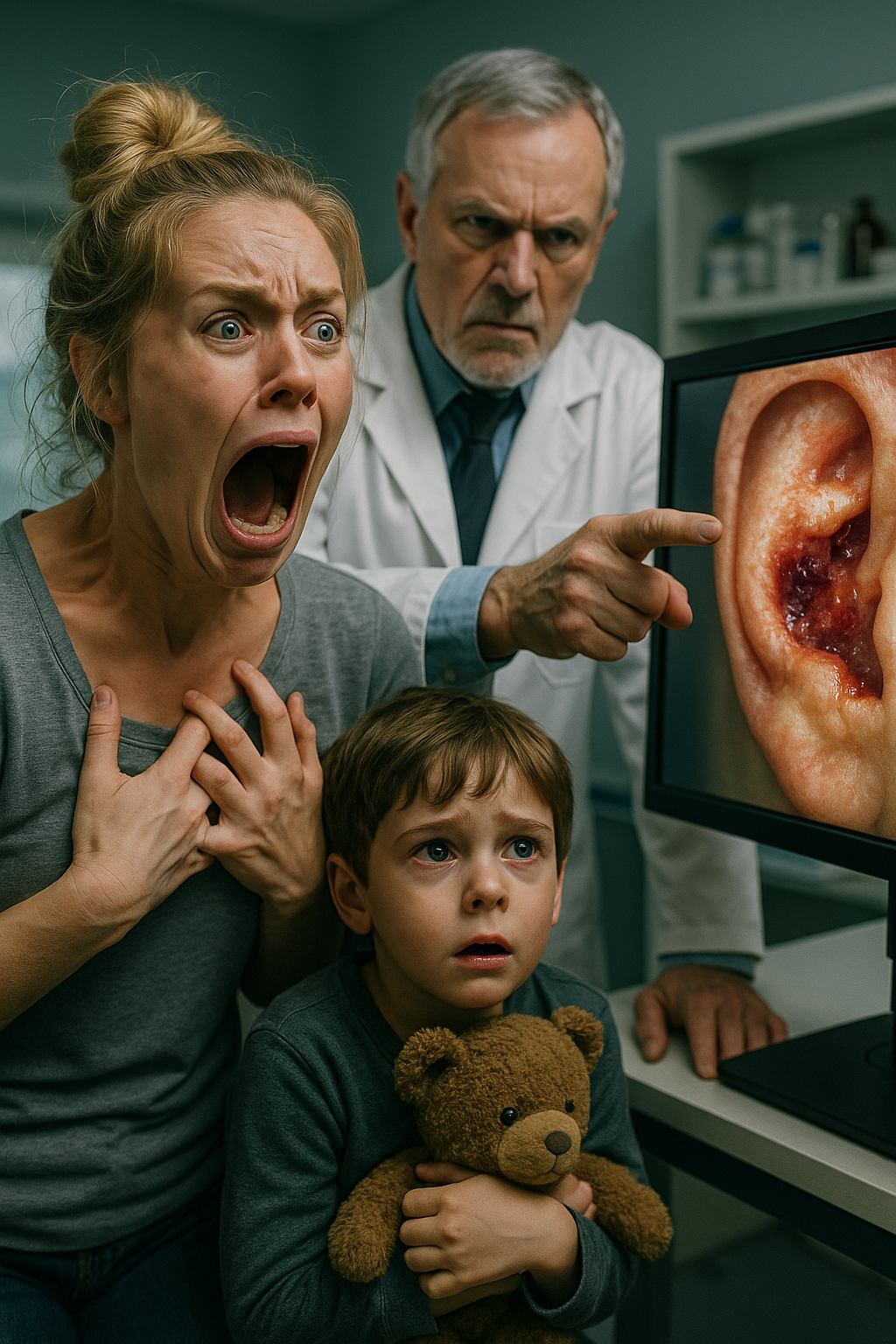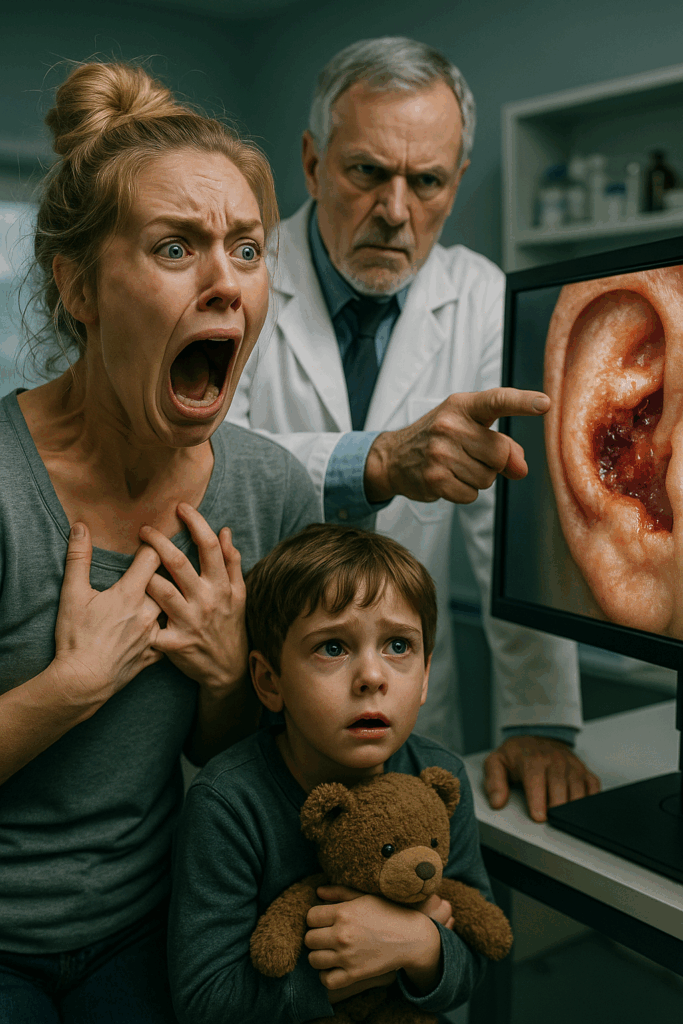My world with Robert was a polished, gleaming surface. He was a prominent lawyer, respected in his field, charismatic and charming in every social setting. I, Maria, was the supportive wife, the devoted mother to our spirited five-year-old, Max. We had a meticulously curated life—country club memberships, exotic vacations, a future that seemed perfectly mapped out. But behind the shimmering facade, insidious cracks were forming, subtle at first, then widening into gaping chasms. I just hadn’t seen them until a tiny voice and a grave doctor’s discovery forced my eyes open.
Max, a whirlwind of energy and boundless imagination, had recently changed. His bright spark seemed dimmed. He’d jump at loud noises, sometimes flinch if I moved too quickly, and developed a nervous habit of touching his right ear. For weeks, he’d been complaining, a quiet, insistent murmur that tugged at my heartstrings: “Mommy, my ear hurts. Badly.”
I’d attributed it to countless benign possibilities: an allergy, a cold, maybe he’d pulled on it himself while playing. Children are resilient, and bumps and scrapes are part of childhood. But as his complaints grew more frequent and his fear more palpable, I knew something was genuinely wrong.
“Don’t tell Daddy,” Max whispered, his small hand gripping my blouse tightly as we waited at the pediatric ENT’s office. His voice was laced with a deep-seated fear that instantly made the hairs on my arms stand up.
I knelt, meeting his gaze. “Don’t tell him what, honey? Did you do something wrong?” My mind raced through potential childish transgressions, worried about Robert’s often-stern reactions to Max’s energetic mishaps.
Before he could answer, the nurse called his name. My internal alarm bells were ringing, but the routine of the doctor’s visit momentarily quelled them. In the examination room, Dr. Evans, a calm and experienced specialist, offered Max a friendly smile. “Alright, young man, let’s get that ear checked out.”
Max’s tiny body visibly stiffened. He eyed the otoscope with apprehension, turning to me for reassurance. I gave him a gentle squeeze. “It’s okay, sweetie. Mommy’s right here. Dr. Evans is going to make your ear feel better.”
The doctor gently inserted the otoscope, his gaze focused. His calm demeanor quickly evaporated. His brow furrowed, his eyes widening almost imperceptibly. He adjusted the light, leaned in closer, then slowly, carefully, withdrew the instrument. He looked at me, his face now devoid of its gentle smile, etched with a stark, undeniable seriousness.
“Maria… could you step over here for a moment, please?” His voice was low, carefully controlled, but carried a chilling undercurrent of urgency.

My legs felt like jelly as I moved towards him. On the monitor, magnified to grotesque detail, was the inside of Max’s delicate ear: severely swollen, deeply bruised, and actively bleeding. A wave of sickening dread washed over me, threatening to pull me under. “Oh my God… what… what is that?” I stammered, my voice barely a whisper.
“This,” Dr. Evans said, his voice grim and resolute, “is a traumatic injury. This is not from an infection, or a fall. This was caused by force. Someone has been pulling or twisting his ear—hard. Repeatedly. And recently, judging by the fresh injury.”
The room began to spin. The pristine image of my life, my marriage, my family, shattered into a million fragments. The unspoken implication was a hammer blow to my heart. “You mean—someone did this to him? Intentionally?” My voice was hoarse with horror and disbelief.
Dr. Evans nodded, his eyes filled with compassion and regret. “Maria, I am legally mandated to report this. This is suspected child abuse. You need to contact the authorities immediately.”
My gaze snapped to Max, who sat rigid on the examination table, his small face streaked with silent tears, his eyes wide and terrified. A blinding, white-hot fury ignited in my soul. “Max,” I pleaded, my voice barely holding steady, conveying a desperate plea for truth. “Please tell Mommy. Who hurt your ear?”
Tears streamed down his innocent face, a silent river of pain and fear. He swallowed hard, his little body trembling, then whispered a single, devastating word that ripped my world apart.
“Daddy.”
The word, so small, so innocent, echoed in the sterile room, mocking the years of trust, love, and partnership I had invested in Robert. A profound, chilling numbness enveloped me, leaving only a searing core of righteous anger. “What did you say, Max? Can you tell Mommy again?”
He broke down, loud, wrenching sobs wracking his tiny frame. “When I don’t sit still… or when I can’t eat my vegetables… Daddy pulls my ear very hard,” he cried, his voice barely audible between gasps. “He says big boys don’t cry. And if I tell you, he says he’ll send you away and I’ll be all alone.”
My breath caught in my throat, a physical gasp of agony. The man I married, the father of my child, the pillar of our community, was a monster. He had been systematically harming our son, isolating him with threats, twisting his innocent mind with fear. The polished facade of our life exploded, revealing the grotesque cruelty festering beneath.
I rose slowly, the initial shock giving way to a cold, unwavering determination. My voice, though quiet, resonated with a fierce power I had never known I possessed. “He made one unforgivable mistake.”
Dr. Evans looked at me, his face etched with somber understanding. “What was that, Maria?”
I met his gaze, my eyes burning with a maternal fury that promised retribution. “He forgot who this boy’s mother is.”
The ensuing hours blurred into a nightmare of police interviews, child protective services interventions, and the harrowing experience of watching Max, my brave little boy, recount the terrors inflicted upon him. Robert was apprehended at his law firm, his composed exterior finally cracking under the weight of the accusations. Subsequent investigations uncovered a pattern of similar, hidden injuries on Max, strategically placed to evade detection. My life, my marriage, my perceived future – all reduced to ashes.
I sought refuge with Max at my childhood home, retreating from the public spectacle and the venomous attacks from Robert’s influential family, who staunchly defended him, accusing me of mental instability and vengeful fabrications. Robert, leveraging his legal expertise and connections, tried to twist the narrative, painting me as an emotionally unstable wife seeking to destroy his career.
But Max’s testimony, though delivered with a child’s fragility, was consistent and true. And Dr. Evans’s medical report stood as undeniable, clinical proof.
As the legal proceedings unfolded, a disturbing pattern began to emerge about Robert. Former colleagues and even distant relatives hesitantly came forward, describing his controlling nature, his explosive temper hidden beneath a veneer of charm, his need for absolute obedience. His younger sister, Elena, bravely reached out to me, confessing that Robert’s father, a domineering and emotionally abusive patriarch, had instilled in Robert a warped sense of discipline. Elena revealed that Robert had always struggled with controlling his anger, a dark inheritance from their own childhood, which manifested as an obsessive need for control over others.
This revelation, while offering a disturbing context, provided no absolution. It showed the depths of his trauma but emphasized the active choice he made to perpetuate it.
The legal battle was an exhausting odyssey, but justice, though slow, eventually prevailed. Robert, stripped of his reputation and legal standing, was convicted and sentenced, his public image irrevocably tarnished.
Life with Max began its slow, arduous journey of healing. We immersed ourselves in therapy, finding strength in shared vulnerability and the unwavering bond of a mother and son. Max, released from the oppressive weight of fear, slowly began to unfurl, his laughter returning, his trust in the world tentatively rebuilding under the warmth of my unwavering love. The flinching at loud noises gradually lessened, replaced by a growing sense of safety.
Then, approximately eight months after Robert’s conviction, a discreet package arrived. Inside was a small, beautifully engraved silver locket. Attached to it was a letter, penned in an elegant, familiar hand. It was from Robert’s mother, Victoria.
I stared at the letter, a knot of dread in my stomach. Victoria had been a distant, almost aloof figure in our lives, a woman I had always felt judged by. Why now? What more could she possibly want?
The letter, however, was not what I expected. It was a confession, a testament to her profound regret and a desperate plea for forgiveness. Victoria revealed that she had known about Robert’s escalating violence towards Max. She had known about his father’s abusive tendencies towards Robert in childhood. She had been trapped in her own gilded cage, terrified of Robert’s powerful anger and the patriarchal authority he wielded. But she could not stand by and watch her grandson suffer.
The letter detailed her secret struggle, her desperate attempts to gather proof without directly confronting Robert, knowing his volatile nature. She explained that she had subtly encouraged Max to confide in me, to speak about his ear. She had deliberately not tried to stop Robert’s initial punishments, however horrifying, hoping it would lead to a more overt injury that would force my hand and bring outside intervention. The locket, she explained, contained a tiny, almost invisible audio recording device, which she had gifted to Max months ago, urging him to wear it “for good luck,” hoping it would capture evidence if he was ever truly in danger. The recordings were subtle, but clear enough to catch Robert’s hushed threats, his angry words, the sounds of Max’s whimpers. Victoria had not sent the locket to the police directly, fearing Robert’s retribution and wanting me to be the one to empower Max’s voice. She knew I would act. She had been the silent enabler of his abuse, but also, in her own broken way, the architect of his exposure. Her final words chilled me to the bone: “He never understood the strength of a mother’s love, Maria. Not yours, and not even mine. And for that, he paid the price.”
I held the locket, its cold silver a stark contrast to the burning emotion in my heart. Victoria, the woman I had always seen as complicit, had, in a twisted act of maternal protection, helped to save my son. Max, now freely drawing a vibrant picture of a superhero, was safe. The cracks in our family’s facade had been exposed, revealing not just darkness, but also a fragile, desperate form of courage. But the path ahead was still uncertain.
How do I reconcile my anger towards a woman who knew, yet hesitated, with the profound impact of her final intervention? How do I navigate this complex legacy of trauma, hidden pain, and unexpected alliances with Max when he’s older? And what kind of mother, what kind of woman, would I become, having navigated such profound betrayal and uncovered such a horrifying, yet ultimately redemptive, truth, all for the unwavering, fierce love of my child?


